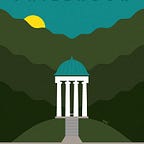The Rural Oklahoma Museum of Poetry
By Tracy Truels
Just off Highway 412, in the town of Locust Grove, the Rural Oklahoma Museum of Poetry (also known as ROMP), invites you to get “In the Bones.”
That’s the theme for this year’s exhibition, announced jovially by the presence of a full-length skeleton draped over the entrance’s wire archway. Inside, visitors encounter over a dozen poetry writing prompts nestled in thrift-store-inspired set-ups. These are “poetry machines”: analog devices that rely on visitors to take the helm as operators.
This bright yellow, one-room wonder started with ROMP founder Shaun Perkins in 2012.
“I didn’t have any idea what was going to happen with it,” she tells me. “I just had the dream one night that I had a museum that had poetry machines in it. And immediately I thought, okay, well, we’ll make that happen. I wanted it to be like a Route 66 roadside attraction — partly that and partly just a crazy little museum that would inspire people in whatever creative ways.”
On one table, a handwritten note invites me to pick up a photographic slide and write a quick poem about the image it holds. From a vintage case I pull out a metal-framed image of a young woman posing in front of a 1950’s-era car. She has short, styled hair and wears a stunning plaid dress, complete with a full-length skirt and heels.
There are fragments like this all over the place: pieces of stories that have been found, like the slides, or some that have been intentionally left by other visitors. Their poems and musings are everywhere, tied in one instance to box springs that have been turned sideways. ROMP is like many museums in that the objects have been carefully considered and then placed. Like any good machine, each part serves a purpose.
Unlike many museums, however, there’s a “Poet’s Retreat” next door. The house, which originally belonged to Shaun Perkins’ grandparents, is listed on Airbnb and has regular guests. I knock on the door mistakenly, thinking it another part of the museum. Dena Standingwater answers and invites me in.
Sitting at the kitchen table, she tells me about the Poet’s Retreat: “First of all, my son had booked the retreat in the past and it is perfect for our family to get together to visit, play dominoes — my mother’s favorite — et cetera, at a spacious home rather than a hotel.”
In the spirit of the poetry museum next door, one large wall has been designed as a comment book, except here guests write their messages directly onto the wall. Dena has written her note in Cherokee, a phrase she translates into English as “People coming together as one and working to help one another.” She tells me about how her father just turned 90 and spoke Cherokee as his first language at home.
“The retreat is intriguing to say the least,” she continues. “I feel Shaun [Perkins] has opened up her grandparents’ home to visitors in a positive way to spark curiosity in reading and writing and create an interest of their own.”
While my polite but mistaken knock may not be exactly what Perkins had in mind when she founded ROMP, these in-person encounters with language are precisely what she tells me about when we meet up in town. She instructs teachers in local workshops not to teach poems at all, but to “develop an environment that allows [poetry] to happen.”
This is exactly what she’s done at ROMP, and at the Poet’s Retreat. You go there; things happen. There’s probably a poem involved, or a piece of a story — some mash up of the past that calls your attention to the present moment.
In town, I meet Shaun at the Sequoyah County VFW building. The heat index is pushing 100, but that doesn’t slow down preliminary work on a building renovation. She gives me a peek at the building’s original 1912 tin ceiling. The vision is to turn the building into a thriving community center abuzz with arts and culture.
Not far away, I stop at the ROMP Rummage Store. Yes, the museum has its own thrift store, with a ROMP Museum Annex inside called “Mona’s Closet.” Proceeds from the thrifty, vintage finds fund work at the museum.
The last stop is Wonder City Coffee just down the street, a charming coffee shop with a meeting space and library in the back. ROMP often holds free poetry workshops here.
Back on the road to Tulsa, it occurs to me that ROMP works because it was designed from inception to be exactly what so many museums strive for right now: “an experience.” While the founder jokes that the designation as a “museum” may have just been to achieve the needed “M” in the acronym ROMP, it’s nonetheless fitting. Maybe you’re looking for the muse, or maybe you just want to explore a small Oklahoma town and find a bit of history.
Either way, the Rural Oklahoma Museum of Poetry is waiting.
Tracy Truels is the Assistant Director Interpretive Engagement at Philbrook Museum of Art.
